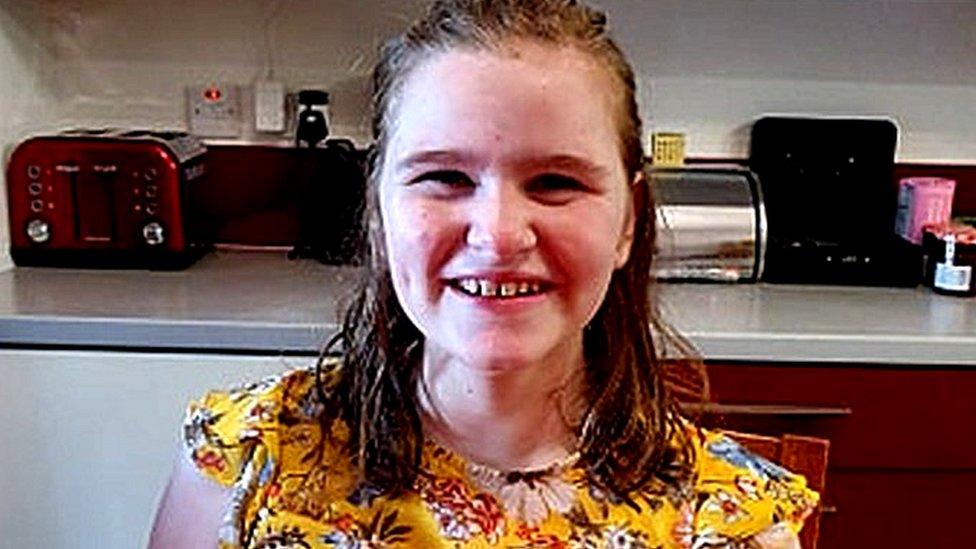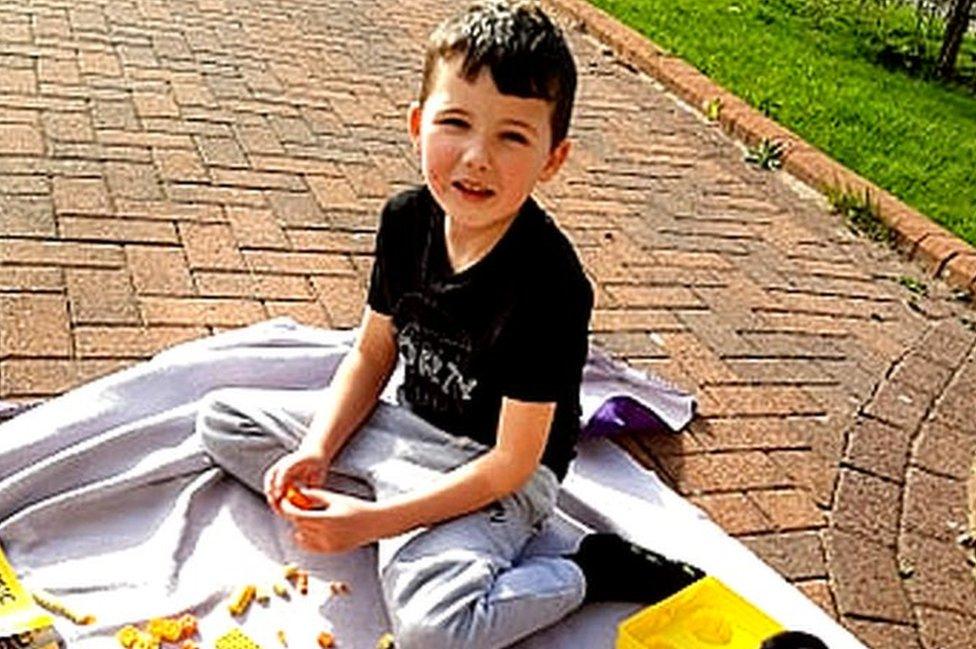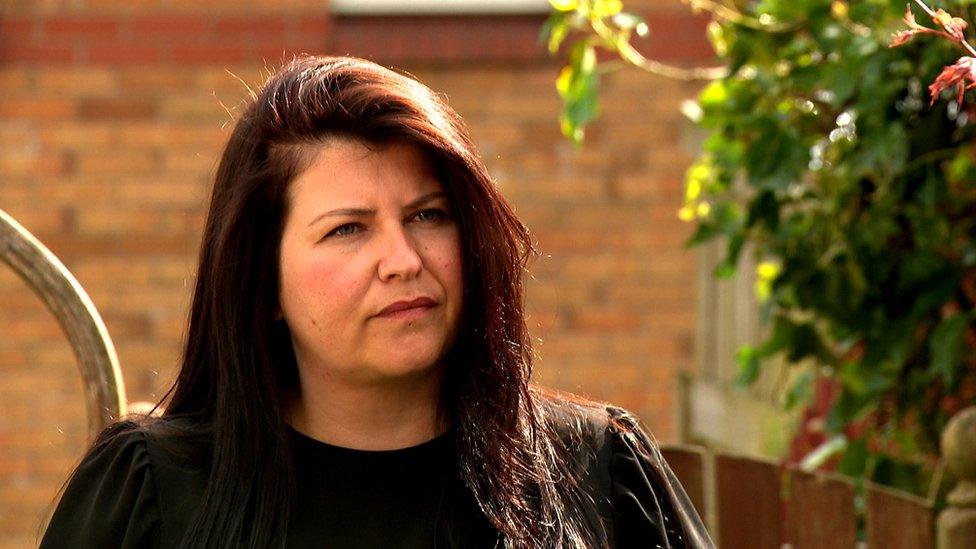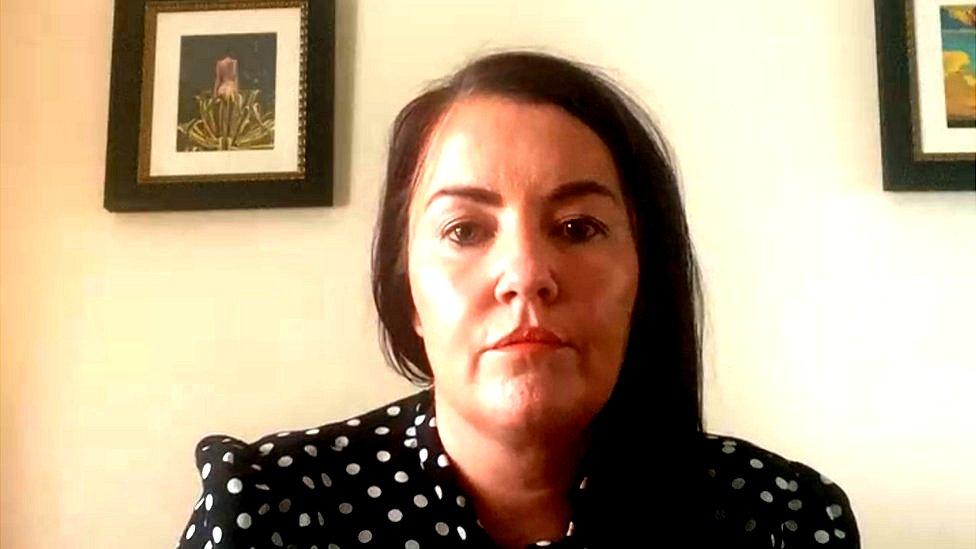Coronavirus: Lockdown life 'a challenge' for vulnerable children
- Published

Leia's family has found the lockdown difficult
The coronavirus lockdown is tough enough for everyone but for children who rely on school for much more than learning, experts claim it's becoming damaging.
Children with additional support needs are without their vital routines and, according to a coalition of charities, some families have been pushed into crisis.
Six weeks of isolation means six weeks without complex caring and teaching support and no respite for families.
Lockdown has been a challenge for teenager Leia.
She is enjoying having her family around more but her routine has been turned upside down by Covid-19.

Tracey says there is no respite for the family without Leia's routine
The 14-year-old has a genetic condition which means she doesn't speak and has some learning difficulties. She usually attends a school for children with additional support needs.
Her mum Tracey - who is a key worker - says Leia is now nervous about going out.
'Routine is gone'
Tracey said: "She is great fun to be around and has an ability to light up a room." But lockdown has not been easy for her.
"Lockdown has been mixed. The extra unpredictability has been difficult for her. Now she is terrified of going out and is nervous when she sees people at all. We have to be very calm and regulated to help her but that's hard when we don't really know what's happening."
It is also very tough on the rest of the family.
She said: "There is no respite which is tricky to deal with."
Tracey says they have had a lot of people checking in with them including the school and she is not sure what anyone else could have done during what is a "difficult situation".

Jaxon is happy to stay at home but his mum feels he is falling behind on development
It's a similar story for six-year-old Jaxon.
His autism diagnosis means he usually gets full-time additional support at school.
His mum Julie says he is enjoying home life but she's worried that being away from normal routine could affect hard fought-for gains.
Julie describes their situation at the moment as "muddling along" and she feels his education needs may stall.

Mum Julie fears lockdown will set her son's education back
She said: "Nobody could have planned for this circumstance but it is challenging. So we have to try to keep up with the work schedule from school, keep him going outside for his daily exercise."
"The longer it goes on the harder it will be getting him into reality. We will be back to where we were a few years ago."
Lynn Bell is chief executive of The Love Group - a charity which helps provide education and social care services for vulnerable people. It is part of the Scottish Children's Services Coalition.
The coalition is urging these families to make contact and access the services which can help them negotiate the lockdown.
Ms Bell said statistics show that just under a third of children in Scotland have an additional support need.

Lynn Bell from The Love Group is urging families to seek help
She said: "From dyslexia to autism, moderate to quite complex needs and mental health issues - they are all exacerbated by the isolation and a lot of the support can't be replicated within the domestic environment.
'A level of care'
"The isolation is creating social and emotional behaviour issues which is then putting pressure on the families, taking them into crisis. We have seen a huge increase in requests for respite services."
Families are not getting a break from the pressure and only about 1% of vulnerable children are accessing help at the school hubs in operation during the lockdown.
Ms Bell urged families to contact schools, teachers social workers or their usual support workers, saying they are a front line service and help is available.
She said: "For vulnerable children education is a level of care and these young people need that social and emotional support that goes with it."
The Scottish government says it is working with other agencies including Cosla to ensure families get "appropriate support" and has announced funding for autism charities, external.

A SIMPLE GUIDE: How do I protect myself?
AVOIDING CONTACT: The rules on self-isolation and exercise
HOPE AND LOSS: Your coronavirus stories
LOOK-UP TOOL: Check cases in your area

- Published23 April 2020
